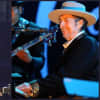Something has happened to New York rap shows. No longer are they exercises in stoic toughness. Last night at Santos Party House, only a couple people stood around in that classic NYC Rap Stance™, arms folded, legs spread like they were about to do some hardcore stretching. Instead, there were kids flailing around, wearing bandanas as capes. It was T-shirt weather, but at least one person was wearing a knee length cloak.
They were there for an edition of the revived Shortcuts party, headlined by internet-hyped and Texas-based rapper Post Malone, who was performing his second show here in just a few days. The vibe was accepting—I scanned the room looking for those familiar rap show guys and couldn't find even one angry dude looking like he wanted to fight the world. I guess what happened to New York rap shows is that they got fun again.
The crowd was goofy, but arguably no one was having a better time than Post himself. He flopped, bounced and staggered around, rictus grin wide enough to swallow the lights in the room. Still, the few songs he played all grappled with death and sadness. On "Too Young," he chanted the mantra I don't wanna die too young so many times that it started to seem like he believed that if he just keeps saying it, he'd be able to prevent it from happening. He played the song twice in a row. Then he did "White Iverson," his breakout hit. It bleeds nostalgia for the life he's currently living, like he's an older version of himself, looking back on right now: When I started ballin' I was young/ You gonna think about me when I'm gone/ I need that money like the ring I never won/ I won, with those last words echoing into a wisp of melancholy. Listening to Malone, you get the impression he has the weight of multiple lifetimes bearing down on him.
The dissonance between what he was singing and the look on his face took me a couple minutes to reconcile. How could he be smiling? The answer came when he stopped mid-song during "Too Young" and just stood there, looking so happy to be where he was—on a stage in a club mostly full of adoring fans. "White Iverson" and "Too Young" are just barely out in the world—for lean-back listeners who take cues from radio or late night TV, they basically don't even exist yet—but here was a room full of kids singing along to every word. Suddenly that smile seemed less about contradicting his darker thoughts and more about accepting them—even celebrating them.
At least some of last night's crowd was probably drawn by a curiosity for how Post Malone will slot into the music industry as we know it. Will he stick around? Where does he fit exactly? Does he even fit? The answer is that he falls outside the lines just enough to fit in perfectly. He's everything you want from a post-Young Thug contemporary of iLoveMakonnen who channels the based positivity of Lil B and the off-the-wall-who-really-gives-a-fuck spirit of ODB while providing genuine, sloppy (and, okay, pretty druggy) emotional honesty in the face of looming existential crisis.
Does that mean Post Malone will become famous? I'm sure labels have called, and "White Iverson" may go more viral, but I'm still not sure what famous really means in 2015. I do feel confident that he's not going to be the next Kanye, and I wouldn't want him to be. Malone works with unbridled, visceral emotion. Happiness and sadness are the same to him, and he celebrates all the weird, confusing, mixed-up fears and desires of being a human with a grin wide enough to bust right out of his face. What does success actually mean when you have that inside you?
Lead image: Instagram @ali.suli


